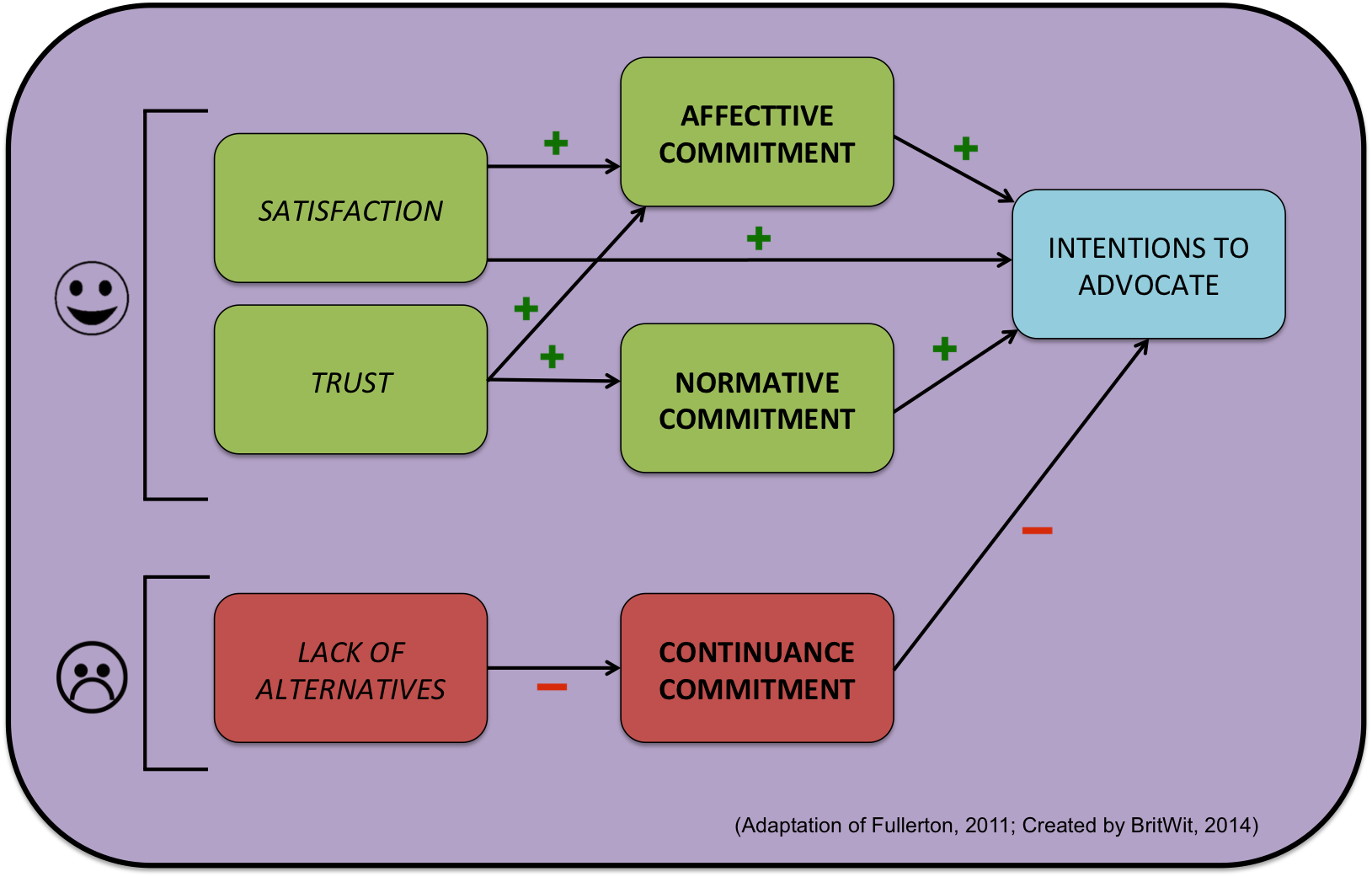Get the 'Thinking Cap' on, because today we learn...
A serious flaw that many professionals overlook in todays rushed and spontaneous world is assuming the only reason their customers stick with them is because they are loyal advocates to the business. This naivety is making many businesses lose customers, as they are unaware that different customer groups remain committed for different reasons. Today I'd like to tell you a little about Customer Commitment, and why its so VITAL to know why the hell your customers use your company in the first place; why some stick around and why others run away at the first chance they get.
I'll even throw in a pretty diagram for the folks who get excited by a little 'visual aesthetic'.
So here's what I'll cover. Three types of Customer Commitment, what they mean, an modern day example of each and what you as a business insider need to understand to keep these folks as happy customers. Make sense? Great - on to business!
Affective Commitment
These guys are like your best friends, in fact no, they are your heroes. An emotional attachment such as love or friendship is formed, creating a HUGE feeling of satisfaction and trust between the customer and company. These folks sit at the peak of commitment and will go above and beyond to advocate and protect you. In fact, they will often get upset and defensive if someone speaks negatively of you.
Example: Lets look at a company like Apple for a second. There are many customers who are die-hard loyalists and will fight and defend the company regardless of what choices they make. This is because of its history and the symbolism it has built for itself over the years. Despite what reviews new products or services get, these chaps and chappettes will be first on the scene to get them. Always.
You should reward these people and make sure they know that you love them in return. It's pretty much like a solid relationship that needs attention every now and again to keep the love flowing. Whats the equivalent of giving them a bouquet of flowers every now and again, what gets them excited? Its your company... so you'll know better than I do!
Normative Commitment
This type of commitment is formed through similar morals, ethics or values that are bound by an element of trust. The customer feels obliged to support a company because the company holds similar beliefs to their own. If you've looked at the diagram you'll notice there's no 'Satisfaction' in this commitment type. That's because there's no emotional bond such as friendship or love, this relationship is purely based on shared beliefs!
Here's an example: Imagine a customer is driven by social responsibility and ethics towards non-animal testing. When they look for make-up or soap products they will want to find a retailer who displays similar thoughts. For that reason they may choose to shop at Body Shop. They make this decision because both they and the organization have demonstrated key beliefs in the non-use of animal testing.
However, it should be stressed that these folks aren't friends nor are they super-loyalists like those in the above commitment group. If a competitor with the same shared values but with a better satisfaction offering comes along, you've more than likely lost this customer. You should therefore make a valiant effort to harness trust and build happiness, friendship and love with these customer groups to turn Normative Commitment into Affective Commitment.
Continuance Commitment
The name doesn't sound all that bad, but this guy can be pure evil if not given the correct attention. You see there are two types of Continuance Commitment; the first takes place when the customer is forced to commit to the company through some form of contract, and the second is purely based on the fact that the switching costs for the customer to stop using the company are too large. Put simply, Continuance Commitment is when an unhappy customer us unable to leave.
For type 1, lets use the example of a cell/mobile phone provider. Contracts usually last 12 to 18 months and if you find yourself wanting to leave because the service sucks, you'll have to pay a heavy cancellation premium of which you more than likely can't afford. You call up the company various times but get through to no one helpful and your problems remain unsolved. You feel trapped, like a hostage with no freedom and are utterly miserable. When the contract period comes to an end you flee, leaving a stinking hatred of negative WOM behind you.
When customers pay for their service in advance or sign up for a contract, never just assume that the money is in the bank and they should become a lower priority. These folks are some of your most valuable customers and you should be focusing on spending time and effort to make sure they are happy with the service they are receiving. You may already have money in the bank for this year, but what about next year? Neglect your customers and kiss goodbye to a contract renewal, genius.
The second type is based on switching costs (time/money etc.) restricting the customer from being able to leave. Let's take the example of a website/hosting provider. A customer uses the service for their website, they upload all of their images, content and blog articles etc. over a longitudinal period of time. Let's say they run into several issues they didn't know existed when they signed up, but they have invested so much time into building a presence on this host that it would simply take too much time to just up-and-go and re-start all over again.
Companies in this position should adopt a heavily personalized customer service approach. Make sure your customers are getting what they need and if they aren't hold their hand a little to show them that you truly care. You never want your customers to feel like they are stuck with you for the wrong reasons, you want them screaming Velvet Underground's "I'm sticking with you, cause I'm made out of glue" at the top of their lungs instead.
Companies that offer contract payment or require a lot of investment are some of the largest gold mines for Affective Commitment. If you do it right, positive WOM will spread like a wildfire of happiness and you'll have people lining up at your door. Just MAKE SURE you have the means to be able to keep every single one of them happy!
So there you have it. Albeit a bite-size chunk of what Customer Commitment is all about, I hope you can leave with a broader understanding of the topic. The main takeaway is that regardless of what commitment bucket your customers fall into, you must always make them feel valued to the point where they want to return. Your aim should be to create satisfaction at every turn so you have an army of Affective Commitment Advocates!
Thank you for your on-going support, sharing and comments and until the next one!





